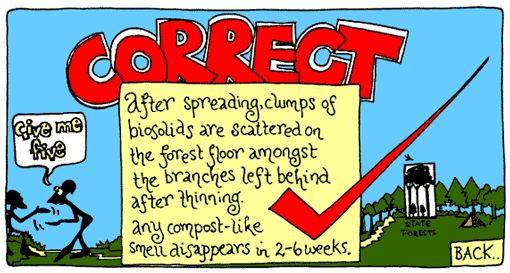For this reason, it is important to answer: What exactly are biosolids?
As stated above, biosolids are treated sewage, particularly nutrient-rich organic materials that are produced from the treatment of domestic sewage, in a treatment facility of course. These materials can be processed and recycled to be used as fertilizer, resulting in productive soils and stimulated plant growth. Biosolids can also be returned to the environment in other ways.
 |
| An in-depth look at how biosolids are treated. (Click here for bigger version.) |
It's the wastewater treatment process that's the reason why we have biosolids in the first place. This treatment improves the quality of waters around Canada, due to regulations on dumping waste in bodies of water. The wastewater now must be treated; biosolids recycled or buried in landfills.
 |
| Illustrating a positive of biosolids. |
- Crop production can be improved due to biosolids used as fertilizer
- Water quality is protected
- Landfill space is conserved
- Cost effective and creates jobs (good for the economy)
NEGATIVES:
- Health hazard due to possible dangerous chemicals
- Contamination could easily occur due to improper treatment
- Decreases property value
- Odour (described as "distinct" and "like a sewer")
 |
| Actress and Halifax native, Ellen Page, expressed her take on biosolids in NS. |
I feel mixed on the use of biosolids. I think that I would like to see more research and learn more about waste treatment in general before making a decision on their use. However, I think that biosolids, if completely safe, have a lot of potential in making improvements in the world, and a lot of negative feedback on the use of biosolids most likely comes from bias or misconception, especially the Western view that the use of waste in anything is gross and unsanitary.
Sources:
- "Biosolids: Fertilizer or Pollution?" Lynchberg College Virginia. Apr. 2008. Web. 3 June 2011. <http://www.sencer.net/Outreach/pdfs/DCSymposium08/Posters/LUbiosolids.pdf>.
- "Biosolids Management." City of Toronto. Web. 3 June 2011. <http://www.toronto.ca/water/biosolids/index.htm>.
- "Biosolids.com | About Biosolids: Biosolids Benefits." Biosolids.com. 2002. Web. 03 June 2011. <http://www.biosolids.com/benefits.html>.
- "CWWA - FAQ - Biosolids." CWWA/ACEPU. 2010. Web. 03 June 2011. <http://www.cwwa.ca/faqbiosolids_e.asp>.
- News, Cbc. "Biosolids Cause Stink in HRM - Nova Scotia - CBC News." CBC.ca. 16 Aug. 2010. Web. 03 June 2011. <http://www.cbc.ca/news/canada/nova-scotia/story/2010/08/16/ns-biosolids-stink-halifax.html>.
Hi Michelle,
ReplyDeleteI found your blog entry to be most informative. I did not look at the negatives as much as the positives in my entry. The decrease in property value is an all new negative I had not heard of prior to reading your blog. I also agree that there the product that is biosolids is conducted by waste and could prove to be more dangerous then what we may think.
This way jammed pact with research and I am happy I learned a large amount by reading this.
Great entry,
Amanda.
Hi Michelle.
ReplyDeleteI liked how you chose to show a discussion from someone (Ellen Page) who actually is affected first-hand by the biosolids used for fertilizer and not just present the facts. I also agree that more research should be done to improve this technique.
However, even if it is not 100% safe, I think that it still could be used because its positives outweigh the negatives greatly and there is a fairly reliable system in place to treat it. Although it's not certain that it could be completely harmless, neither is what is being done to the earth by filling the oceans and landfills with biosolids or using chemical fertilizers that causes groundwater contamination.
This is another good post.
-Monette